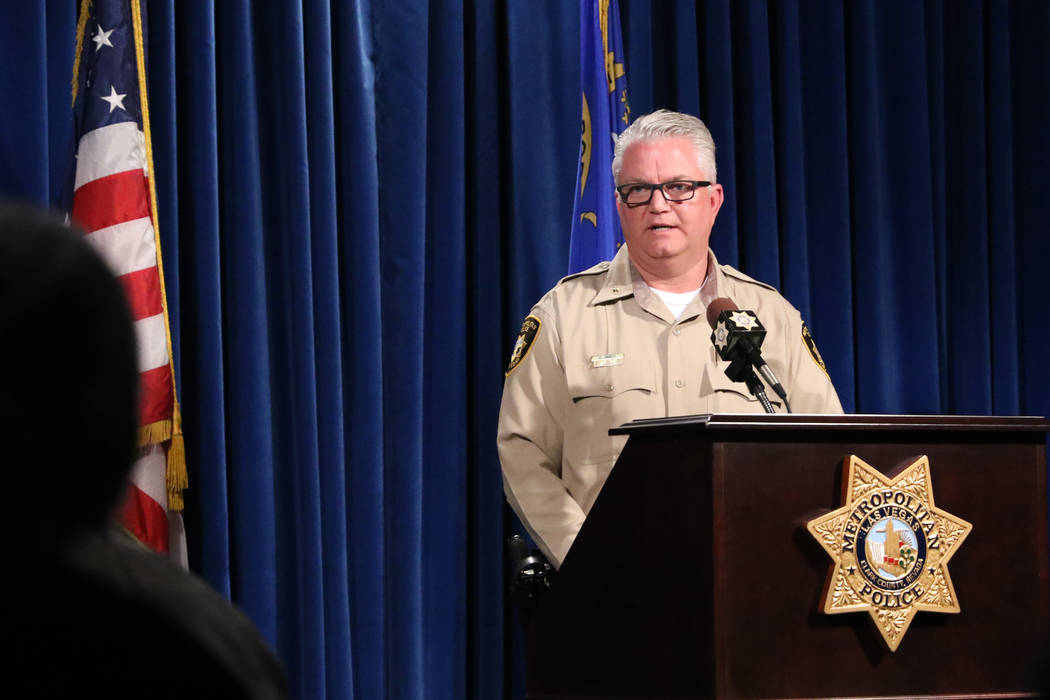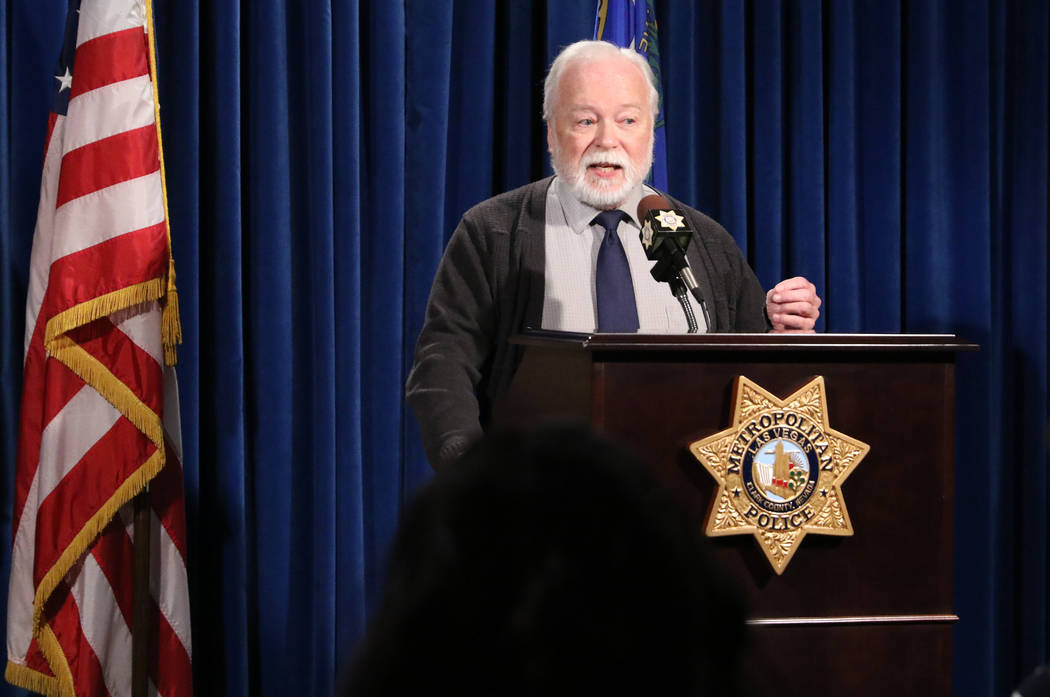Small amount of ricin found in Las Vegas hazmat incident
A “negligible” amount of ricin was found in the Las Vegas apartment of a man who died of an apparent suicide, although what killed him remained unclear, officials announced Wednesday.
The Centers for Disease Control and Prevention confirmed the presence of ricin, a deadly toxin derived from castor beans, in the central valley apartment after a hazardous materials investigation on Tuesday and the discovery of the man’s body on Monday, Metropolitan Police Department Deputy Chief Christopher Darcy said at a news conference.
The ricin was contained to the apartment located on the 5300 block of Retablo Avenue, although police closed down the area Tuesday and asked neighbors to shelter in their apartments “out of an abundance of caution” while they investigated, he said.
“As of this morning, the scene was safe and there was no threat to the residents,” Darcy said Wednesday.
On Monday, police found 36-year-old man and lying on the couch was a hypodermic needle, syringe and spoon with brown substance. Police confirmed that substance was heroin.
He had a suicide note next to him, as well as a bag of red castor beans, which is used to make ricin.
— Mike Shoro (@mike_shoro) February 20, 2019
Inside the apartment, they found Matthew Joel Friedman, 36, deceased on the couch. Next to him on the floor, Darcy said, were a hypodermic needle, a syringe and a spoon with heroin.
He had a handwritten note on a table near his body that “talked about a longing for death and a hatred for the world,” Darcy said. Investigators also found a bag of red castor beans, which are used to make ricin, police said Wednesday. The beans were found in their natural state, prompting investigators to remove his body and seal the apartment.
A secondary investigation involving several valley agencies followed on Tuesday.
During the investigation, a small, “negligible” amount of ricin was discovered in a wet, mash form in a coffee filter inside the apartment, Darcy said.
Dr. Joseph Iser, chief health officer for the Southern Nevada Health District, said three of five samples tested positive for ricin, and the CDC agreed with the determination.
“We don’t need any more samples to determine,” Iser said. “We know that there was ricin in that apartment.”
The Clark County coroner’s office had not yet determined Friedman’s cause and manner of death as of Wednesday.
“No public health threat”
The first responders who had been exposed and evaluated showed no symptoms of poisoning, Iser said. The ricin wasn’t airborne and therefore, unlikely to be inhaled, he said.
“This was contained. There is no public health threat. There is no releasable kinds of ricin that anyone should be worried about,” Iser said.
Police had no evidence of any other ricin connected to Friedman, Darcy said. They’re investigating whether it was Friedman who had made the ricin, and how and where he may have purchased the castor beans, Darcy said.
The beans are legal to buy, as they can be found in products such as makeup, Iser said. The product of ricin is illegal, Darcy added.
Several people who knew Friedman told people they had heard him make “disturbing statements about suicide and death” in recent months, Darcy said. Friedman talked about being in the late stages of cancer, and he appeared visibly ill in the days preceding his death, Friedman’s roommate told police.
The roommate offered insight into Friedman’s life and mental health, but he didn’t provide much information on the ricin, Darcy said.
Metro remains in the early stages of its investigation, but police know Friedman was a part-owner of an audio/visual company in Las Vegas that closed about six months ago, Darcy said.
Business licenses for two companies, BioLabor Techs LLC and Exec. Solutions Incorporated, list a man named Matthew J. Friedman as a president or manager, Nevada Secretary of State records show.
Darcy asked anybody who knew Friedman to call police at 702-828-7777.
Previous ricin cases
It wasn’t until 2005 that a special Southern Nevada task force equipped to handle a variety of dangers, including ricin, was created.
Its inception came two years after a biochemist, Tomoo Okada, injected himself with the deadly agent. In that 2003 incident, Las Vegas authorities were unprepared and ill-equipped to handle it, the Las Vegas Review-Journal reported at the time. His death was the first known death in Clark County attributable to ricin, the newspaper then reported.
Police officers at the scene, inside a home near Rainbow Boulevard and West Sahara Avenue, handled the liquid toxin and castor beans without any protective equipment as they packaged them to send to the hospital for testing. Some officers went home without any decontamination.
The task force called All-Hazards Regional Multi-Agency Operations and Response, or ARMOR includes Las Vegas, Henderson and North Las Vegas police, the Clark County and Las Vegas fire departments, and state and federal agencies.
The poison again made headlines in 2008, when enough ricin to kill more than 500 people was found at Extended Stay America, 4270 S. Valley View Blvd., the Review-Journal reported at the time. The discovery was made after the room’s occupant, Roger Bergendorff, was hospitalized for respiratory problems.
Bergendorff was later sentenced to serve between 37 months and 46 months in prison.
Contact Mike Shoro at mshoro@reviewjournal.com or 702-387-5290. Follow @mike_shoro on Twitter. Review-Journal staff writer Rio Lacanlale contributed to this report.
Warning signs of suicide
Signs of suicide can include changes in conversation, behavior and mood, according to the American Association of Suicidology.
If a person talks about being a burden to others and feeling trapped; if a person starts acting recklessly or withdrawing from friends, family and activities; if a person starts experiencing rage, anxiety, or a loss of interest — among other factors — reach out to the person or seek help.
For more information, visit www.suicidology.org/resources/warning-signs. The National Suicide Prevention Lifeline, 1-800-273-TALK (8255), provides access to trained telephone counselors, 24 hours a day, seven days a week.
Ricin facts
— Ricin poisoning is not contagious. It cannot be spread from person to person through casual contact.
— No antidote exists for ricin.
— In 1978, Georgi Markov, a Bulgarian writer and journalist who was living in London, died after he was attacked by a man with an umbrella. The umbrella had been rigged to inject a poison ricin pellet under Markov's skin.
How ricin works
If it is injected, a dose of ricin about the size of a pinhead could be enough to kill an adult. A much greater amount would be needed to kill people if the ricin were inhaled or swallowed, according to the Centers for Disease Control and Prevention.
Injection of a lethal amount of ricin would at first cause the muscles and lymph nodes near the injection site to die, according to the CDC. Eventually, the liver, kidneys and spleen would stop working, and the person would have massive bleeding from the stomach and intestines. The person would die from multiple organ failure.


























